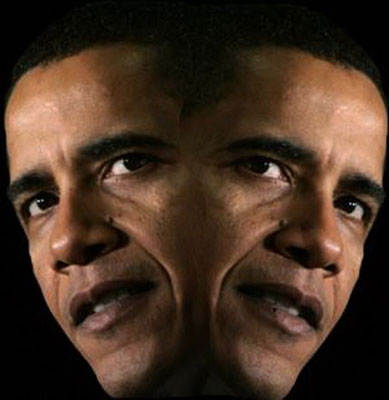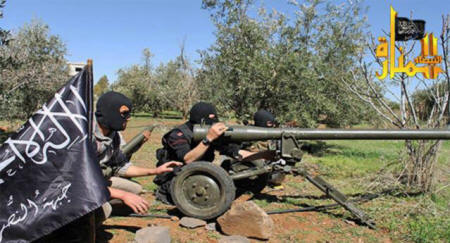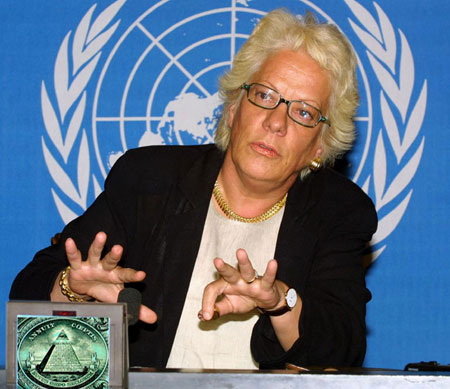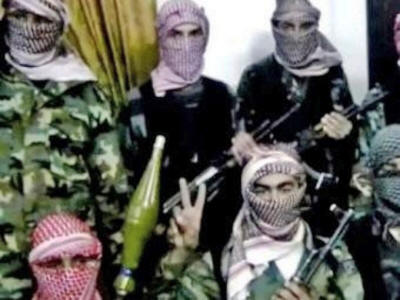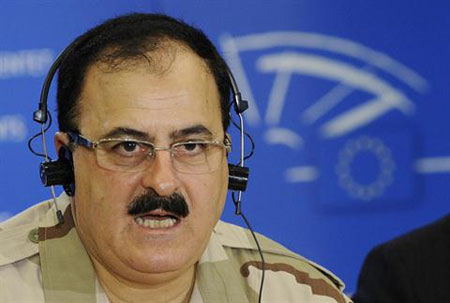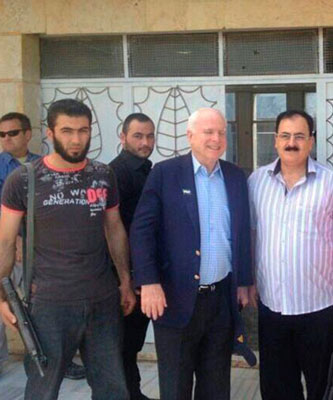MODERATOR: Good morning everyone, and
thank you for joining this call this morning.
Today, we’re going to have a background
call with three senior Administration officials. We have - Senior
Administration Official One will be [Senior Administration Official
One]. Senior Administration Official Number Two is [Senior
Administration Official Two]. And then [Senior Administration
Official Three] is our Senior Administration Official Three.
So they’re going to talk about some of the designations and then
take a few questions. So we’ll start with our Senior Administration
Official Number One, over to you.
SENIOR ADMINISTRATION OFFICIAL ONE: Okay. The State Department has
formally amended al-Qaida in Iraq as a Foreign Terrorist
Organization and Executive Order 13224 designations to include the
alias al-Nusrah Front.
Al-Qaida in Iraq, or AQI, was first
designated by the State Department in October of 2004. By way of
background, in 2011, the AQI emir, Abu Du’a, tasked Abu Muhammad al-Jawlani
to establish al-Nusrah Front in Syria. Abu Du’a provides strategic
guidance to al-Jawlani, al-Nusrah’s leader.
Since November 2011, al-Nusrah Front has claimed hundreds of
attacks, nearly 600, in major city centers across Syria in which
numerous innocent Syrians have been injured and killed. AQI has
dispatched money, people, and materiel from Iraq to Syria over the
past year to attack Syrian forces both on its own initiative and at
the request of AQI’s facilitation network members in Syria.
Al-Nusrah Front has sought to portray itself as part of a legitimate
Syrian opposition, but today’s actions are intended to expose them
and make clear that the United States believes that al-Nusrah’s
extremist ideology has no role in a post-Assad Syria. Among the
consequences of today’s actions is a prohibition against knowingly
providing or attempting or conspiring to provide material support or
resources to or engaging in transactions with al-Nusrah Front.
It’s important to note that the designation of al-Nusrah Front does
not mean we have changed our view regarding Assad as the leader of a
state that has been a designated state sponsor of terrorism since
1979. Today, we’ve also sanctioned pro-Assad regime elements, and my
colleague from the Treasury Department will speak more specifically
to these sanctions and to the designation of two key members of al-Nusrah
Front. Over.
SENIOR ADMINISTRATION OFFICIAL TWO: Good morning. This is [Senior
Administration Official Two] from the Treasury Department. Thank
you.
Today, we have taken a number of actions
alongside and in coordination with our colleagues at the State
Department in order to continue and intensify our pressure against
the Assad regime, its affiliated militias, and to take action
against terrorist leaders who are active in Syria.
Since the beginning of the uprising in Syria, we have been working
to powerfully and swiftly intensify sanctions against the Assad
regime, to isolate the Syrian Government, hasten Assad’s fall, and
to encourage those within the Syrian Government to abandon the
regime’s campaign of violence. We have also used targeted sanctions
to expose and combat the interventions of Iran as well as terrorist
groups like Hezbollah which have been actively supporting Assad’s
regime.
The actions we took today fall into basically two buckets: actions
against two militias that have been perpetrating violence in
coordination with and in affiliation with the Assad government, and
then actions in concert with the al-Nusrah action that the State
Department has announced to target two main leaders of the Nusrah
Front. I’ll take those in turn.
Since the beginning of the unrest in Syria, the Shabiha have
operated as a direct action arm of the Government of Syria and its
security services, with Shabiha units providing support to units
from designated security services, such as the Syrian Air Force
intelligence and Syrian military intelligence, that have been among
the most active in the violence.
Ayman Jaber is currently a Shabiha
leader responsible for directing Shabiha operations in Latakia,
Syria on behalf of the Syrian regime and is working with the
Ministry of Defense and other senior regime officials, including
Maher al-Assad, to procure weapons for the Shabiha units under his
command.
His brother, who we are also designating today, Mohammad Jaber,
arranged for the transportation of pro-Syrian regime thugs from the
Shabiha to Turkey in order to attack anti-Syrian regime persons
there.
The other pro-regime militia that we are sanctioning today is Jaysh
al-Sha’bi, which operates throughout Syria and has been particularly
active in Damascus and Aleppo where the militia has supplemented
Syrian Government forces operations against the opposition.
Jaysh al-Sha’bi was created and
continues to be funded and maintained with support from Iran and
Hezbollah, and it is modeled after the Iranian Basij militia, which
has proven so deadly and effective at using violence and
intimidation to suppress political dissent in Iraq.
In addition to our actions against the regime proxies, Treasury is
targeting Nusrah Front leaders Maysar Ali Musa Abdallah al-Juburi
and Anas Hasan Khattab. Al-Juburi is the religious and military
commander for the Nusrah Front in eastern Syria.
He moved from Mosul, Iraq to Syria in
late 2011 with the objectives of transferring al-Qaida’s ideology
and techniques to Syria and forming likeminded terrorist groups.
Khattab was involved with the formation of the Nusrah Front for AQI
and has communicated with AQI leadership to coordinate the movement
of funds and weapons for the Nusrah Front. Khattab also works
closely with al-Qaida-linked facilitators to provide logistical
support to the Nusrah Front.
All of these actions are a part of our
ongoing efforts to target actors within Syria working to frustrate
the desires of the Syrian people to end the violence and to realize
a representative government. We will continue to target the thugs
that have worked with the Assad militias, just as we will the
terrorists who try to cloak themselves in the flag of the legitimate
opposition.
And with that, I’ll turn it over to [Senior Administration Official
Three].
SENIOR ADMINISTRATION OFFICIAL THREE: Thank you very much. The steps
that we are announcing today in Washington really are the result of
growing American concern about the escalation of violence in Syria.
First of all, let’s be clear: The Syrian regime started this
violence by brutalizing what was a peaceful protest movement. We all
know that. We all understand that. And the Syrian regime has used
aircraft, it has used artillery, and it appears that it has even
used missile to attack the Syrian population and to attack what was
a peaceful protest movement.
And we have considered the Syrian
regime to be a State Sponsor of Terrorism since 1979. We’ve taken
additional steps against the regime in terms of sanctions and in
terms of isolating the Syrian regime and putting pressure on it
internationally and economically.
Today’s actions against the Shabiha, against the Jaysh al-Sha’bi -
the People’s Army as they call it - against people like Ayman Jaber
and Mohammad Jaber are both a recognition of the violence that the
regime is inflicting on the Syrian people, and then it also repeats
and emphasizes our message that the Syrian regime needs to stop
that, and Assad needs to step aside and a political transition needs
to begin.
But when we think about that political transition, extremist groups
that are denouncing the government and attacking the government,
they themselves, as extremists, have no role in that transition and
in a future Syria.
The protest movement that started out
peacefully that I mentioned - it started out peacefully in February
and March of 2011 - has always called for a tolerant Syrian society
which is free, which respects the human rights of all Syrians
equally.
That was in the national vision
statement that the Syrian opposition published in Cairo on July 3rd,
2012 - that is to say about five months ago, five and half months
ago - and in other statements which Syrian opposition figures have
announced. But Nusrah, as [Senior Administration Official One] was
just talking about, and as [Senior Administration Official Two] was
saying, the Nusrah Front is directly linked to al-Qaida in Iraq, and
we know what its ideology is.
And we know that the Nusrah Front has denounced the Syrian
Opposition Coalition’s founding, that it rejects the vision
statement that was issued in Cairo, that I mentioned, of a tolerant
society, and insists that instead of elections there must be an
Islamic state imposed upon Syria.
And the Nusrah Front, extremists like
it, have no place in the future of the Syrian society, in a tolerant
society. And so we have made clear that Nusrah also is an extremist
organization and it has to be isolated and that more moderate
forces, more forces that believe in tolerance as a model for Syrian
society, they need to carry the work of the political transition
forward.
I think I’ll stop there.
MODERATOR: Thank you. At this time, Operator, we’ll be ready to take
questions for our three senior Administration officials.
OPERATOR: Ladies and gentlemen, if you wish to ask a question,
please press * followed by 1 on your touchtone phone. Once again,
for any questions, please press *1 at this time. One moment, please.
And we’ll go to the line of Ilhan Tanir with Turkish Daily. Please
go ahead.
QUESTION: Thanks so much. Quick couple questions. One of them is:
How is the reaction so far from the Syrian - other Syrian opposition
groups? As far as we can see, there is a lot of complaining about
this decision on Twitter and social networks that - argument is
while the U.S. Government has been talking, Nusrah Front is coming
here to fight, and basically they are fighting with the Assad
regime, and die.
Can you give us what kind of reaction and see if the Nusrah Front is
fighting with the Assad regime? I just don’t understand what kind of
message is that you mentioned. The message is to Assad regime to
leave, but you are labeling his organization as a terrorist
organization while they are fighting with the Assad regime. Thank
you.
SENIOR ADMINISTRATION OFFICIAL THREE: I guess I’ll take my first
stab at that. I don’t know if my colleagues want to join in later. I
will let the Syrian opposition representatives speak for themselves.
I don’t need to speak on their behalf.
It’s not proper. What I would say is that the United States and
other Friends of the Syrian People have long acknowledged the Syrian
people’s right to self-defense and to defend themselves against the
brutality of the Syrian regime.
There is no question about that, and we
have been saying that for many, many months.
However, acknowledging the right of self-defense is not itself a
justification for extremism. And I want to underline here that many
people in Syria are afraid of extremism. Many people in Syria are
not fighting for an extremist cause.
Rather, they are fighting to have their
dignity respected, they are fighting to have their human rights
respected, and they do not want - and the United States and the
Friends of Syria do not want one terrorist regime to be replaced by
a new extremist model. Rather, it is important that Syrians who
believe in tolerance, Syrians who believe in the respect for the
human rights of all Syrian citizens be the ones who move the
political transition forward.
And so there is no contradiction. Instead, what is important is to
understand that extremists fighting the Assad regime are still
extremists, and they have no place in the political transition that
will come. Bashar al-Assad will depart. If he departs today, it’s
better than if he departs tomorrow. There is too much bloodshed. But
extremists should not dictate that political transition.
OPERATOR: You do have a question from the line of Michael Gordon
with The New York Times. Please go ahead.
QUESTION: Yes, this is primarily for [Senior Administration Official
Three], but the others can chime in. Could you please explain what
practical, tangible effect this edict on the Nusrah Front might
have? It stated that it would prohibit American or American entities
from providing support. Are there any such Americans who are
providing support? And if not, how will this affect those who have
been providing support who are probably sympathetic with this group?
And lastly, tomorrow there’ll be a meeting in Morocco of various
opposition groups and Friends of Syria. Do any members of this
political opposition gathering in Morocco have influence or control
over armed opposition elements in Syria today?
SENIOR ADMINISTRATION OFFICIAL THREE: Michael, I’m going to let my
colleagues answer the question about the practical and tangible
effects because they’re more involved in the immediate
implementation of the measures.
But on the - with respect to your
last question about members of the Syrian opposition who will come
to Morocco for the Friends of the Syrian People meeting, what I
would say on that is that there are not members of armed groups
represented at this meeting that I am aware of.
However, there are people here who definitely coordinate with armed
groups, with the Free Syrian Army, and who have regular contact with
elements of the Free Syrian Army.
That is not to say they are giving
instructions to it; they do not. It is not to say that they are
telling it what to do or what to say in the international field;
they are not. In a sense, the Free Syrian Army is a separate
organization from, for example, the Syrian National Council or the
Syrian Opposition Coalition.
They are separate organizations. But
there certainly are communications between the two, and there are
members of the Syrian political opposition here in Morocco who
contact and talk to people from the Free Syrian Army.
I’m - I’ll turn it over to my colleagues to talk about the practical
and tangible effects and your other question.
SENIOR ADMINISTRATION OFFICIAL ONE: Okay, so I think I need to go
next.
This is [Senior Administration Official
One]. Michael, as we said at the top, the technical impact of the -
adding al-Nusrah Front as a new alias for AQI, includes this
prohibition on knowingly provided material support and the freezing
of all property and interest in property in the United States or
that come within the United States under the control of U.S.
persons. So there are some practical sanctioning effects of the
designation, and it can be a powerful tool over the long run, for
law enforcement purposes.
But I think one of the primary effects of this designation is to
really expose the presence of al-Nusrah Front, an organization that
has been established by the leadership of AQI in Syria, and its
activities there.
SENIOR ADMINISTRATION OFFICIAL TWO: If I could just add - this is
[Senior Administration Official Two] - exposing the operations and
the identities of al-Nusrah’s leaders is a key objective here.
So I just wanted to underscore that.
Having these individuals on a blacklist has a practical impact
beyond just the direct implications of U.S. law. It means for
individuals who have demonstrated that they desire to travel back
and forth across borders, actions like these in the past have
frustrated that ability, have exposed them to being interdicted and
detained.
It also means that as al-Nusrah tries to wrap itself in the
legitimacy of the opposition that does reflect the Syrian’s people
desires, we have called them out, and for those who are seeking to
support the legitimate opposition of the Syrian people, we have
drawn a bright line. So I think there are very real sort of
second-order effects to today’s actions as well.
OPERATOR: You do have a question from the line of Margaret Brennan
with CBS News. Please go ahead.
QUESTION: Hi. This is a question for [Senior Administration Official
Three]. Al-Nusrah Front is viewed as an effective, very lethal
fighting force inside of Syria. When it comes to what’s actually
happening on the ground right now, what does today’s action do in
terms of in any way lessening what they control or what they
influence inside of Syria?
SENIOR ADMINISTRATION OFFICIAL THREE: Al-Nusrah Front is one of many
groups that are fighting the Syrian regime now. It is not the only
one. And in fact, it is a minority. Its influence has grown over
recent months, but it still represents a minority element within the
broader armed opposition to the Assad regime.
So I don’t want to leave any kind of
impressions that we are in any way acting against the broader Free
Syrian Army, which is a much bigger organization.
And I’d be very clear we talk - I myself talk to the Free Syrian
Army, and we have talked to them about things like the code of
conduct and how to treat prisoners, et cetera.
We have gotten assurances, and we have
seen in many instances good behavior and even sanctioning against
those elements of the Free Syrian Army that have acted improperly or
against that code of conduct. Nusrah, by contrast, has actually been
involved in summary executions of prisoners, for example.
Whether the American steps today will
immediately curtail Nusrah’s capabilities, I don’t think they will,
but I think other nations that are involved in helping the armed
opposition will now take more seriously our concerns about the
Nusrah Front and its expanding influence, and it is important for
countries to understand what al-Nusrah is and what it represents.
And it is important for the Syrians in the political opposition and
in the armed opposition to understand what Nusrah is and what it
represents. The time of a political transition is approaching. It’s
approaching quickly as events on the ground move. And it is
important to understand that Nusrah is an extremist group that
cannot possibly be a part of the political transition to a tolerant
and free Syria.
OPERATOR: Next we will go to the line of Mina al-Oraibi. Please go
ahead.
QUESTION: Hi. This is a question also for [Senior Administration
Official Three]. If I can ask, do you expect a position to be taken
against Jebhat al-Nusrah Front in Marrakesh tomorrow from other
countries? And I also wanted to know, you said you have been in
touch with the FSA, so have you informed them in advance of this
designation? And have they voiced concerns to you about Jebhat al-Nusrah
Front and what they’re doing on the ground and whether that actually
makes certain civilians in Syria wary of the opposition?
SENIOR ADMINISTRATION OFFICIAL THREE: The meeting in Marrakesh
hasn’t started yet. The ministers have not arrived. And so I don’t
want to prejudge what the outcome will be. But what I would say is
that the previous Friends of the Syrian People meetings in Tunis, in
Istanbul, and in Paris, in each of those occasions, the partner
states of the Friends of the Syrian People have emphasized their
support for a tolerant Syrian society.
They have emphasized their hope that the
next Syrian government, after the Bashar al-Assad regime ends, will
be one that respects human rights and that treats all Syrian
citizens equally, without discrimination, and without prejudice
because of their ethnic or religious views. And I do not think that
this Friends of Syria conference will deviate from that strong
support, that vision of the next Syrian government, after the
political transition begins.
With respect to the Free Syrian Army, they know our concern about
the Nusrah Front. I have talked to them myself about it and we have
talked to others in the Syrian opposition over the past month. And
they know what our position is and I’ll leave it at that.
OPERATOR: And you do have a question from the line of Joyce Karam
with Al Hayat. Please go ahead.
QUESTION: Yes, hi. My question is also to [Senior Administration
Official Three]. Would this make it more likely that the U.S. would
arm non-extremist elements in the Syria opposition? And if the
regime targets al-Nusrah Front now, would the U.S. be okay with
that?
SENIOR ADMINISTRATION OFFICIAL THREE: I’m sorry. I didn’t understand
the second question. Can you say it again?
QUESTION: Yeah. If the Assad regime goes ahead and targets al-Nusrah
Front, would you be okay with that?
SENIOR ADMINISTRATION OFFICIAL THREE: I see. Okay. With respect to
your first question, we have always said with respect to our policy
on providing arms that, number one, we do not provide arms to the
Syrian opposition now. We have also said that the President has
never ruled out in the future providing arms, but we do not do it
now.
But number three, for us, providing arms
has to be done in a way that helps promote a political solution. And
until we understand how these arms promote a political solution, we
do not see how provision of arms is a good idea.
With respect to the Assad regime targeting al-Nusrah, I would simply
say that we have condemned the Assad regime as a state sponsor of
terrorism. We have condemned the Assad regime’s incredibly brutal
and excessive, egregious acts of violence against the Syrian
population.
The news from yesterday is just
shocking. I’m not going to comment on when it targets al-Nusrah,
except to say that we condemn extremism on both sides. We condemn
extremism that is the Syrian regime, and we condemn extremism in the
Syrian armed opposition. Neither one of them presents a good -
neither one of them presents a realistic way forward for a Syrian
political transition that wants to give the Syrian people a system
that will be free and respect the human rights of all Syrians.
MODERATOR: Operator, we’ve only got time for one more question.
OPERATOR: Okay. And that question will come from Hannah Allam with
McClatchy Newspaper. Please go ahead.
QUESTION: Yes. Thanks for the call. I was wondering, how do you
disentangle the sort of Free Syrian Army rebel units from Jebhat al-Nusrah
fighters when there appears to be such close coordination on the
battlefield that’s opened the door to a scenario where somebody like
the Syrian Support Group could come under scrutiny for providing
materiel support to Jebhat al-Nusrah via these other more accepted
rebel groups? And also has the U.S. talked to the Qataris and the
Saudis about cutting off Nusrah - not just state funding but the
individuals that are believed to be funding them from those
countries? Thank you.
SENIOR ADMINISTRATION OFFICIAL THREE: I’m going to answer the second
question first about our diplomatic work. And then with respect to
the first question, I’ll make a comment or two on that, and then -
and/or [Senior Administration Official Two] may wish to add
something in terms of distinguishing.
With respect to our diplomatic contacts, we absolutely have made our
views known about Nusrah to our international partners that are
working with us to find a solution, a peaceful and political
solution to the Syrian crisis. We absolutely have informed them, and
they too know about our views.
I think it is also important here to note one positive sign of how
the Free Syrian Army itself has understood the threat that Nusrah
represents to the political transition in Syria, which is that
during the meetings in Antalya in Turkey last week where they were
working to set up a unified command for the Free Syrian Army,
notably excluded from that meeting was the Nusrah Front, and we
think that was a wise decision. With respect to distinguishing, as I
mentioned in Antalya, the groups themselves know who Nusrah is, and
I think they are better understanding the threat that it represents.
And so we will certainly continue our discussions with them, which
in many cases will be an effort to convince more and more elements
of the Free Syrian Army to stay away from al-Nusrah.
But as I mentioned, the meeting in
Antalya was a step forward. I don’t know if [Senior Administration
Official One] or [Senior Administration Official Two] want to
comment on that business about distinguishing between elements of
the Free Syrian Army and other elements of - or I mean, Nusrah.
SENIOR ADMINISTRATION OFFICIAL ONE: I think the only thing I would
add to that is that we’ve taken an important step today to help
these groups make the - underscore the importance of the
distinction, and the most important thing that we can do in our own
assistance is to continue to, as we always do, to strive to ensure
that our assistance doesn’t fall into the wrong hands.
SENIOR ADMINISTRATION OFFICIAL TWO: Nothing to add from here.
MODERATOR: Thank you all for joining the call today, and thank you
to our officials, and have a good day.
SENIOR ADMINISTRATION OFFICIAL THREE: Thank you.
SENIOR ADMINISTRATION OFFICIAL ONE: Thank you.

